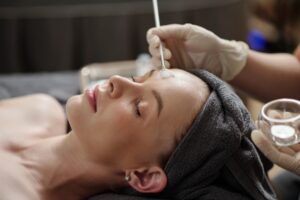 Struggling with lingering acne scars or signs of sun damage that no skincare product seems to touch? You’re not alone. When creams and serums fall short, a chemical peel may be your next best move toward smoother, brighter skin.
Struggling with lingering acne scars or signs of sun damage that no skincare product seems to touch? You’re not alone. When creams and serums fall short, a chemical peel may be your next best move toward smoother, brighter skin.
At UMass Memorial Cosmetic Surgery Center, you can work with top physicians trained in advanced facial rejuvenation. Dr. Joyce McIntyre is a fellowship-trained craniofacial surgeon with expertise in facial rejuvenation, non-surgical enhancement, and fat transfer procedures. She serves as an assistant professor at the University of Massachusetts Medical School, providing patients across Massachusetts and New England with cutting-edge facial treatments.
Reduce Acne Scars With Chemical Peel
Acne scars can linger for years, even decades. Chemical peels help break up discolored tissue and stimulate healthy skin renewal.
Here’s why patients consider chemical peels for treating acne scars:
- Improves texture: Smoother skin surface where deep or pitted scars once appeared.
- Fades discoloration: Evens out red or dark post-acne marks.
- Boosts skin turnover: Encourages natural skin regeneration for clearer, healthier-looking skin over time.
This skin-resurfacing treatment can soften the appearance of both shallow and deeper scars over a series of sessions. Results continue to improve with time.
Treat Sun Damage With Facial Peel
Excess sun exposure accelerates skin aging and leads to uneven pigment, lines, and rough texture. A chemical peel helps reverse this damage at the surface level.
Benefits of this treatment for sun-damaged skin include:
- Minimizes wrinkles: Especially around the eyes and mouth.
- Refines skin tone: Reduces blotchiness and brown spots.
- Rejuvenates dull texture: Restores smoother, more luminous skin.
According to the American Society of Plastic Surgeons, chemical peels ranked among the top five minimally invasive cosmetic procedures in 2022, with 871,409 procedures performed — an increase from 850,132 in 2021.
What Type of Peel Is Best?
There isn’t a one-size-fits-all answer. The type of chemical peel used depends on your skin type, concerns, and treatment goals.
These are the common options used at medical practices like UMass Memorial:
- AHA Peels (light): Best for mild discoloration and dullness.
- TCA Peels (medium): Effective on deeper pigmentation and fine lines.
- Phenol Peels (deep): Used for severe damage but require more downtime.
Your provider will recommend the safest and most effective option tailored to your specific needs. Multiple sessions may be needed for ideal results.
Reveal Smoother, Healthier Skin Today
Bothered by acne scars or sun damage that just won’t fade? Contact UMass Memorial Cosmetic Surgery Center at 508-334-5990 to book your skin-resurfacing chemical peel consultation.




Comments are closed.